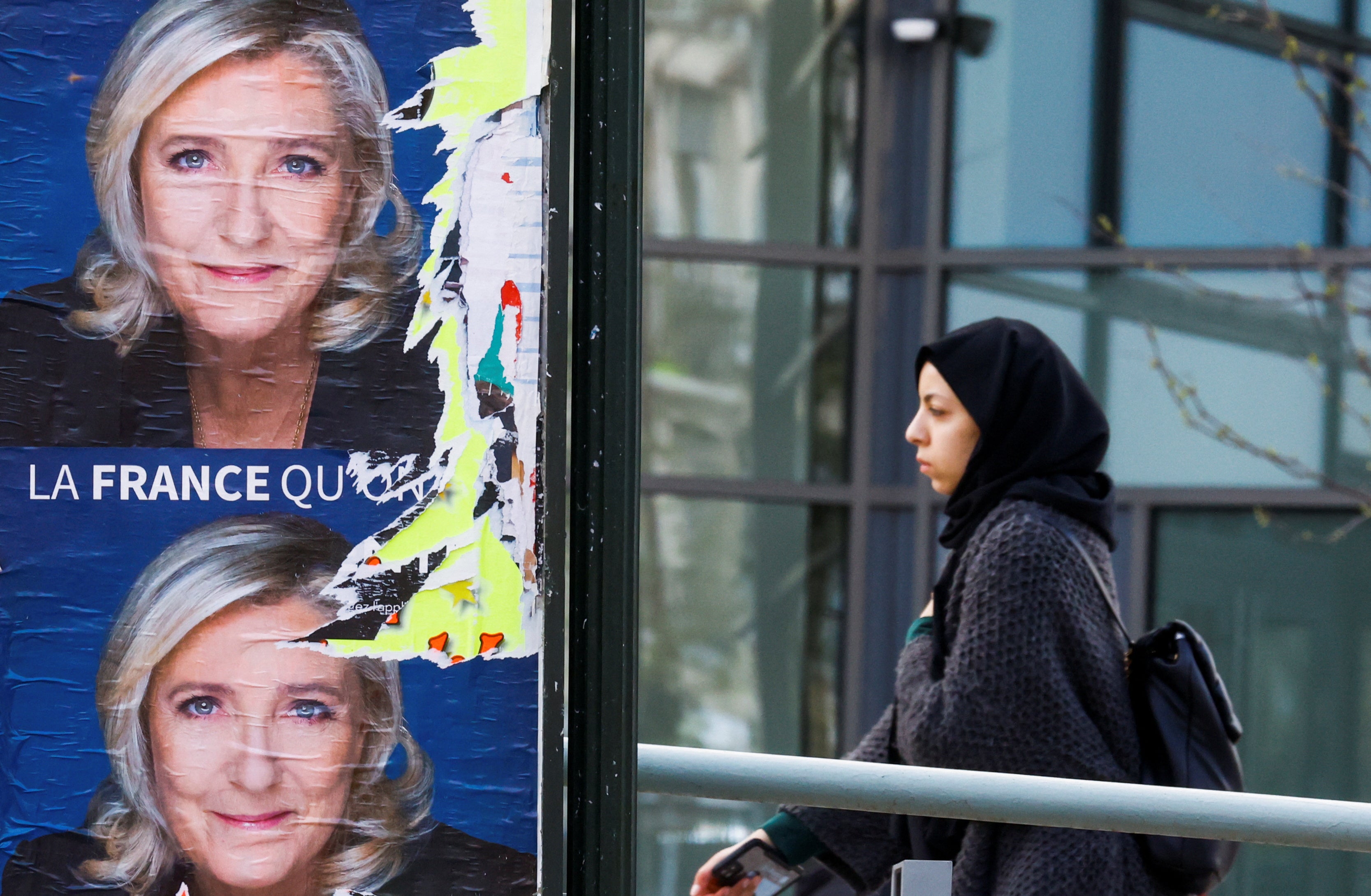Is Marine Le Pen actually far right? It depends who you talk to
Le Pen’s policy proposals have only changed slightly from her 2012 and 2017 manifestos, but her image – and her party’s – has undergone a radical refurbishment over the last few years


But is Marine Le Pen actually far right?” That is the question mainstream television channels are debating before the second round of the French elections on 24 April.
Le Pen’s answer? That the term “far right” is pejorative and should not be used to describe her party – a party which has been known for decades for its fascist roots, as well as its anti-immigrant, racist and Islamophobic rhetoric.
Le Pen has pledged to fine women wearing the headscarf in public – and has previously said the hijab could not be viewed as a sign of a person’s religious belief but an "Islamist uniform" that needed to be banned from the French public space. She has also compared Muslims praying on a street in 2010 to the Nazi occupation, and wants to prevent automatic citizenship for Muslims born in France.
Yet a recent study states only 40 per cent of French voters believe Marine to be far right and xenophobic. This is the third time Le Pen has competed in the French elections – she has never been closer to the presidential office (a recent poll has her at 48.5 per cent, compared to 33.9 per cent in 2017 and 17.9 per cent in 2012).
Her policy proposals have only changed slightly from her 2012 and 2017 manifestos, but her image – and her party’s – has undergone a radical refurbishment over the last few years. So, how has she managed it?
Well, one of the first steps she took was kicking her father, Jean-Marie Le Pen – the party’s co-founder – from what was then the Front National (FN) in 2015 for antisemitism (he claimed the Holocaust gas chambers were ”a detail in history“ and defended the French Vichy regime which collaborated with the Nazis).
Then, in 2018, she changed the name of the party to Rassemblement National (National Rally). She’s also worked hard on her personal image, opening up about the trauma of being a Le Pen and thus associated to racism, as well as her love of cats and living with a childhood friend. She’s even distanced herself from her Le Pen surname, with her campaign posters simply noting “Marine”.
Her supporter base, which includes a strong working class proportion of society that feels economically and culturally excluded, has remained steadfast. One of the policy shifts she’s made to appeal beyond the working class was abandoning her plans to exit the eurozone.
Despite distancing herself from her party’s far-right reputation, that very status has helped her campaign more effectively. No one can doubt the anti-immigrant and fascist credentials of her party, which allowed Le Pen to focus on the economy and consumer buying power.
This proved very effective once the war in Ukraine broke out and increased the cost of living even further. The fact that her plan to cover the costs is to remove funding from social aid to migrants and cut the welcome of unaccompanied minors is a minor detail.
Marine has also benefitted from having Eric Zemmour as a far-right rival in the first round. Zemmour wanted to ban “non-French” names such as Muhammad, has argued that employers should be able to turn down Arab or black people as applicants, and called for a “remigration ministry”.
Despite being eliminated in the first round with 7 per cent of the votes, our report shows how he set the agenda in election season and shifted the Overton window to the right, normalising concepts such as the far-right “Great Replacement” conspiracy. The theory about white Europeans being “replaced” by immigrants through demographic change and mass migration under the control of a small global elite was the title of the Christchurch killer’s manifesto and has been cited by several mass murderers as a motivating factor.
By comparison, Le Pen appeared less extreme, more sympathetic and inclusive. She’s avoided mentioning the theory during this campaign season and stated in 2014 she believed it was a conspiracy theory. However, she’s used more coded terms to refer to it such as saying in 2011 that the French government wanted to “replace the French population by immigrants” and has given speeches about this replacement without actually using the term.
To keep up to speed with all the latest opinions and comment sign up to our free weekly Voices Dispatches newsletter by clicking here
She’s also encouraged people to read Le Camp des Saints (The Camp of the Saints), a novel in which France is overthrown by a million starving and sex-crazed Indian refugees when the French army is not prepared to fire on them. The novel has become a reference book for far-right personalities such as former Donald Trump adviser Steve Bannon.
When it comes to Muslims, she speaks of waging war against Islamism rather than Muslims, and has even said Islam is compatible with France when debating with a Zemmour supporter. However, her policy proposals are distinctly anti-Muslim and she is surrounded by advisers who are much more open about the Great Replacement and their dislike of Muslim religious practice. Her immigration proposals differ little from Zemmour’s plans, but use slightly different language than his controversial “remigration” strategy. Instead, she mentions expulsions or having a referendum to not give automatic citizenship to those born in France.
While she lost some votes in the first round to Zemmour for not using his explosivly hateful rhetoric, her gambit has paid off. She can now be assured of receiving his votes (Zemmour has urged his supporters to vote for Le Pen) while having maintained a more balanced open campaign. Her use of the slogan “For all the French People” both gives the illusion of inclusivity while still pointedly mentioning the French, unlike her rival Emmanuel Macron’s “For all” slogan.
One cannot ignore Macron’s rising unpopularity in Le Pen’s rise either. In past elections, political parties rallied together to block Le Pen from reaching the presidency, but this election remains more uncertain than ever. The stark reality is that nearly 50 per cent of the electorate favours a far-right fascist ideologue that wants to kick immigrants out of the country and have national referendums so as to bypass constitutional checks and balances. The impact of this will be seen over the coming years.
Safya Khan-Ruf is a journalist and researcher for Hope not Hate
Join our commenting forum
Join thought-provoking conversations, follow other Independent readers and see their replies
Comments
Bookmark popover
Removed from bookmarks